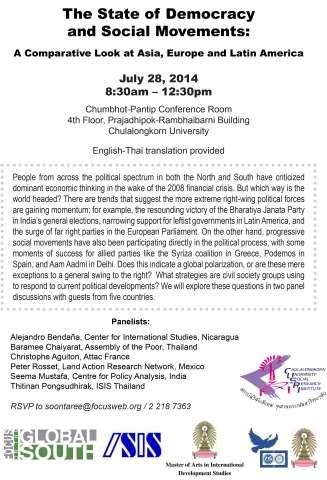Walden Bello | July 28, 2006
Foreign Policy In Focus www.fpif.org
Several guilty parties were responsible for the recent collapse of the Doha round of trade negotiations, but none guiltier than the United States. U.S. Trade Representative Susan Schwab refused to make a serious offer on cutting domestic subsidies for U.S. farmers. Worse, at a late stage in the negotiations, she appeared determined to eliminate any protection for developing country farmers. The WTO’s December 2005 Hong Kong Declaration designated “special products” for exemption from tariff cuts, and Schwab singled out these provisions for attack.
Several guilty parties were responsible for the recent collapse of the Doha round of trade negotiations, but none guiltier than the United States. U.S. Trade Representative Susan Schwab refused to make a serious offer on cutting domestic subsidies for U.S. farmers. Worse, at a late stage in the negotiations, she appeared determined to eliminate any protection for developing country farmers. The WTO’s December 2005 Hong Kong Declaration designated “special products” for exemption from tariff cuts, and Schwab singled out these provisions for attack.
Walden Bello | July 28, 2006
Editor: John Feffer, IRC
Foreign Policy In Focus www.fpif.org
Several guilty parties were responsible for the recent collapse of the Doha round of trade negotiations, but none guiltier than the United States. U.S. Trade Representative Susan Schwab refused to make a serious offer on cutting domestic subsidies for U.S. farmers. Worse, at a late stage in the negotiations, she appeared determined to eliminate any protection for developing country farmers. The WTO’s December 2005 Hong Kong Declaration designated “special products” for exemption from tariff cuts, and Schwab singled out these provisions for attack.
Why the United States chose protection of its farming lobby over the survival of the multilateral trading system it had taken the lead in creating will long be a matter of debate. In the hotly contested congressional elections in November, the Midwestern farming states could determine whether or not the U.S. Congress will remain under Republican control, and Karl Rove was not willing to let anything get in the way of continuing GOP dominance.
U.S. intransigence may well go beyond electoral considerations. It reflects Washington’s unilateralist thrust since George W. Bush came to power in 2001. Like its refusal to ratify the Kyoto Protocol, the U.S. refusal to substantially cut its agricultural subsidies reflects a strategy of making others, including traditional allies, bear the costs of necessary adjustments in the global economy. Last Monday’s unraveling of the Doha Round, in this view, was the death knell of multilateralism.
What is not a matter of debate is that the Doha Round was never meant to be a round to end poverty, as the Group of Eight leaders meeting in St. Petersburg depicted it. The idea that the Doha Round is a “development round” could not be farther from the truth.
At the very outset of the Doha negotiations in November 2001, the developed country governments rejected the demand of the majority of countries that the talks focus on the hard task of implementing past commitments and avoid initiating a new round of trade liberalization. From the very start, the aim of the developed countries was to push for greater market openings from the developing countries while making minimal concessions of their own. Invoking development was simply a cynical ploy to make the process less unpalatable. According to the Financial Times, these “poor tactics” backfired.








